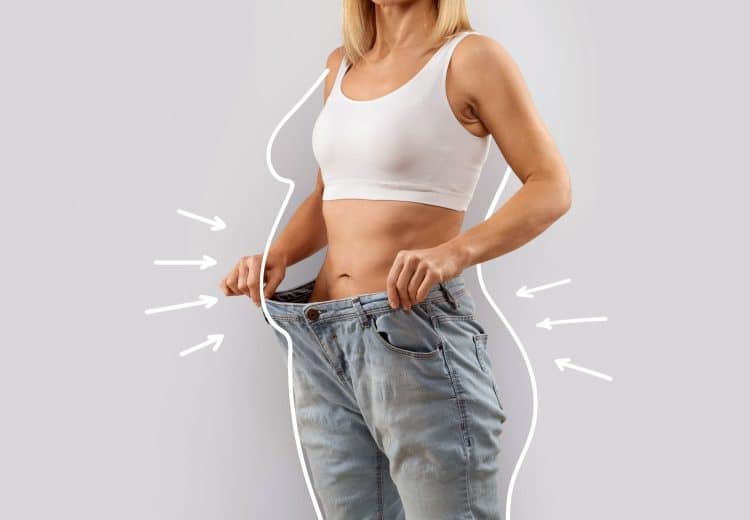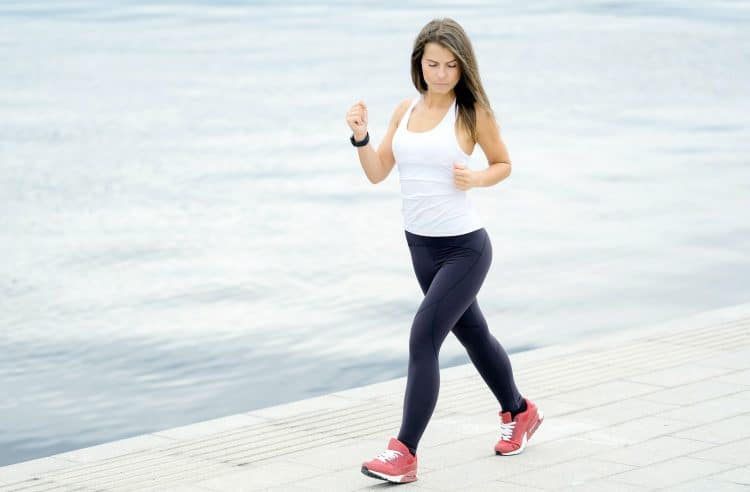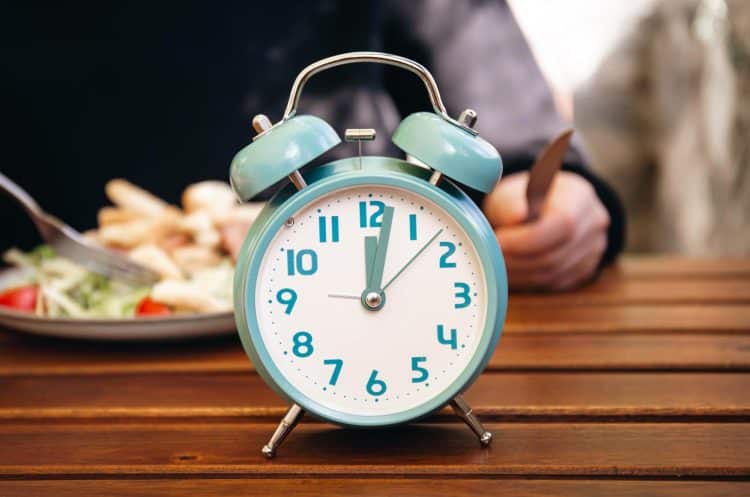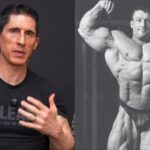Most fitness experts consider exercise essential for weight loss and recommend frequent workouts to maximize calorie and fat burning.
However, I’m not always one of them!
While I don’t deny that exercise can help you burn calories and fat, my 30+ years working in the fitness industry have taught me that workouts are not compulsory for weight loss. In fact, using my extensive knowledge of nutrition and metabolism, I’ve helped hundreds of people lose or manage their weight without exercise.
Despite the positive benefits of physical fitness training, many people struggle to maintain a regular workout schedule. Some don’t enjoy working out, and others cannot train because of injuries or underlying medical conditions. For others, lack of time is the hardest barrier to overcome. A study by Franziska Antoniewicz and Ralf Brand, published on PubMed in 2016, suggests that exercise drop-out rates can be as high as 50% (1).
The good news is that there are plenty of things you can do to lose weight, most of which are ridiculously easy to implement. So, buckle up and get ready to learn how to lose weight without exercising.
The Science of Losing Weight
Before we dive into how to lose weight without exercise, it’s important to clarify what we mean by weight loss and how to achieve it. That way, the rest of the content will make much more sense!
Weight Loss
Fat loss and weight loss are two different but closely related topics. Weight refers to your body mass, which most people measure using scales. However, your weight comprises various components, including:
- Water
- Bone
- Brain
- Skin
- Internal organs
- Undigested foods
- Minerals
- Muscle
- Connective tissue
- Fat
You can lose weight by reducing the amount of any of these components. For example, fast for a day, and you will have less undigested food in your stomach. Alternatively, you could sweat heavily and dehydrate so your body contains less water.
Fat Loss
In contrast, fat loss refers to losing adipose tissue, the scientific term for body fat. Body fat is stored energy, and it’s worth approximately 3,500 calories per pound (2).
Fat loss is usually the result of a calorie deficit, which occurs when you consume fewer calories than you need for maintenance. This energy shortfall causes your body to burn fat for fuel (3). While exercise accelerates calorie and fat burning, it’s important to note that your body burns calories and fat 24/7 – even when you sleep.
So, provided your calorie intake is less than your calorie expenditure, you can lose weight without exercise. However, you’ll probably need to modify your diet so you consume fewer calories than you need.
Fat Loss Vs. Weight Loss
Fat loss invariably leads to weight loss. As such, these expressions are interchangeable. However, it’s important to stress that fat loss is preferable to losing water weight or muscle mass.
Losing muscle can leave you “skinny fat,” where you look slim but are actually soft and weak. In contrast, dropping water weight can lead to dehydration, and you’ll regain it quickly when you drink water or any other hydrating fluids.
Fat loss is the best way to lose weight, as it has the most significant impact on how you look, feel, and perform and is beneficial for your health.
10 Ways to Lose Weight Without Exercise
Weight loss and exercise often go hand-in-hand, but they are not mutually exclusive. In fact, for most people, working out makes up a very small amount of their total daily energy expenditure. For example, of your total daily energy expenditure of approximately 2,000 calories, only 300 or so might be exercise.
In addition, you’ll only burn those extra calories on the days you work out. So, if you exercise three times a week, you may not do even enough to burn half a pound of fat.
The good news is that there are lots of ways to lose weight without exercise. While each one will have only a small impact on your calorie balance, using several of them will add up to a significant calorie deficit.
1. Walk More
While the theme of this article is losing weight without exercise, that doesn’t mean you should be sedentary or physically inactive. The more you move, the more calories you’ll burn per day, and the easier it’ll be to lose weight.
Unless you are very unfit or an Olympic racewalker, walking should not be a form of exercise. Instead, it’s just a way to get from A to B without relying on mechanized transport. The more you walk each day, the more calories you’ll burn, which should promote weight loss.
Related: Calories Burned Walking Calculator
Opportunities for walking more include:
- Walk part or all the way to work or school
- Take the stairs instead of the elevator or escalator
- Go for a walk during your lunch break
- Enjoy a family weekend hike
- Walk with your kids or dog more
- Walk after dinner instead of watching so much TV
- Try walking meetings at work
- Walk to see colleagues instead of calling or emailing them
- Walk rather than drive distances of less than a mile
- Go for a walk with friends instead of sitting in a coffee shop
You’ll see lots of recommendations for how much walking you should do, including the standard 10,000 steps per day. However, these guidelines are arbitrary and have no scientific basis.
Instead, use a tracker to determine how many steps you are currently doing, and then work on doing more. Gradually increase your step count as you feel able until you achieve the level of weight loss you want.
That said, 8-10k steps a day is a suitable target for most people.
2. Stop Drinking Your Calories
Cutting soda from your diet, drinking less fruit juice, and avoiding smoothies can go a long way to reducing your calorie intake and promoting weight loss (6). These beverages all contain a lot of sugar and energy but tend not to be very filling.
For example, a large soda can contain several hundred calories but won’t do anything for your hunger. In fact, sugary drinks cause a rapid rise and dramatic fall in blood glucose levels, leading to hunger and cravings.
If you have a soda or sweetened coffee drink habit, stopping could help you lose weight without resorting to exercise. You can try switching to artificial sweeteners; however, these are not necessarily healthy. A better option would be to drink more unsweetened beverages, such as tea and coffee, and more plain water.
3. Eat More Protein
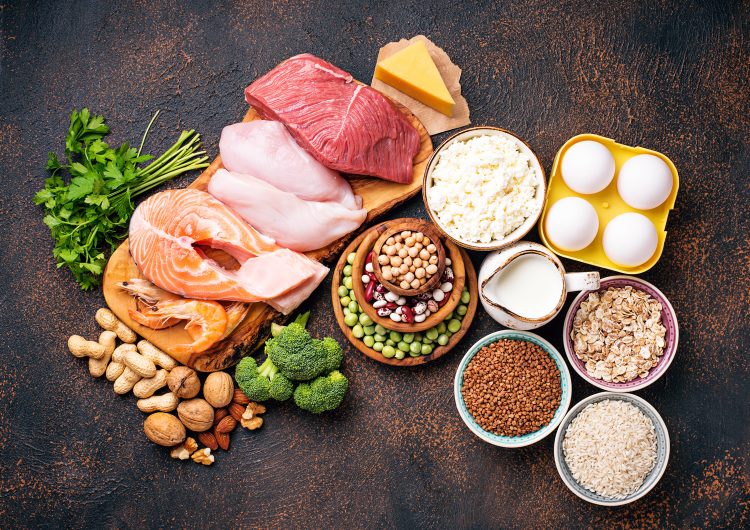
Protein is one of the three macronutrient food groups, the others being carbohydrates and fats. Eating more protein can help you to lose weight without exercise.
That’s because protein has a high thermic effect, meaning it boosts your metabolism. In other words, eating, digesting, and utilizing protein requires energy. Studies reveal that eating protein can increase metabolic rate by as much as 100 calories per day (3).
In addition, meals high in protein tend to be more satiating (filling) than those without (4). Needless to say, less hunger means you’ll probably eat less, further contributing to that all-important calorie deficit.
How much protein should you aim for? The standard recommendation for weight loss is 0.6 to 1.0 grams per pound of body weight. Alternatively, you can use our protein calculator to determine your ideal intake of this critical nutrient.
Good high-protein foods include:
- Almonds
- Chicken breast
- Chickpeas
- Cottage cheese
- Eggs
- Lentils
- Quinoa
- Salmon
- Tofu
- Turkey
Try to include protein in all your main meals and snack on it when you can. That way, you can harness the power of protein all through the day.
4. Eat from Smaller Plates
Cutting calories to create an energy deficit invariably means eating smaller meals. However, seeing that smaller meal on a regular-sized plate reminds you that you are eating less. This often leads to feelings of deprivation and increased hunger.
However, studies suggest that putting smaller meals on smaller plates makes them appear larger than they are (7). This can fool you into forgetting you are eating less and even make you feel as full as if you’re eating a larger meal.
So, buy yourself some smaller plates, bowls, cups, etc., so your smaller meals look normal-sized. However, no going back for a second serving, as that would defeat the purpose of this tip!
5. Fill Up on High-Fiber Foods
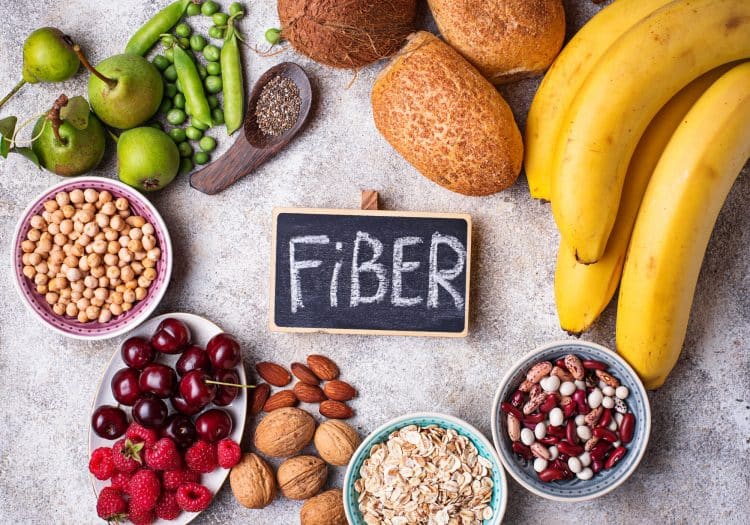
Fiber is a part of most plant-based foods. However, it’s usually removed during processing. That’s a shame because fiber is a powerful weapon in your efforts to lose weight and is very good for your digestive and overall health.
Your body does not have the enzymes necessary to break fiber down. As such, it’s essentially calorie-free. High-fiber foods are typically much lower in calories than low-fiber foods and are also more filling. Therefore, eating foods rich in fiber can lower your calorie intake while preventing overeating (5).
Good high-fiber foods include:
- Apples
- Black beans
- Broccoli
- Chia seeds
- Lentils
- Oats
- Quinoa
- Raspberries
- Whole wheat bread
- Wild rice
Simply increasing your fruit, vegetable, and whole grain intake while eating fewer processed and refined foods will increase your fiber intake and help you lose weight.
6. Eat Slower and More Mindfully
When it comes to losing weight without exercise, how you eat is as important as what you eat. Needless to say, this comes as a big surprise to most people.
Most people eat with very little conscious thought about what they are doing. They mindlessly shove foods into their mouths and, as a result, consume far more calories than they realize, often eating beyond where they are no longer hungry. Eating more slowly and mindfully gives your body the time it needs for your stomach to tell your brain it’s full (8).
So, instead of treating each meal as a race, watching TV, or using your phone when you eat, slow things down and pay more attention to your meal.
Ways to do this include:
- Savoring each mouthful of food, appreciating the texture and taste of each bite
- Chewing each mouthful 20 times before swallowing
- Putting your cutlery down between mouthfuls
- Monitoring your satiety level and stopping eating when you start to feel full
- Not using electronic devices while you eat
- Giving yourself longer to eat each meal
- Not eating while driving, watching TV, or otherwise distracted
- Making each meal more of an event
Anything that puts you “in the moment” while you are eating will increase mindfulness and greater awareness of what and how much you are eating. Doing this, combined with eating more slowly, should result in consuming fewer calories and weight loss.
7. Get More Sleep

Have you heard of the sleeping beauty diet? This once-popular weight loss method involved taking sleeping pills at mealtimes so you doze instead of eating. While this did result in weight loss, the practice of self-sedation for weight loss is hardly safe or healthy!
However, sleep is critical for weight loss, and being sleep-deprived can make losing weight much harder and can even lead to weight gain. Studies report that sleep-deprived people are up to 55% more likely to gain weight than those who get enough sleep (9).
Not getting enough sleep tricks your body into looking for alternative sources of energy. This means food. Hunger levels tend to rise when you don’t get enough sleep. In addition, lack of sleep can decrease willpower, making it harder to resist those unhealthy, high-calorie foods and snacks you know you’re supposed to avoid.
Too little sleep also affects the hormones that regulate hunger (ghrelin and leptin). It increases insulin resistance, leading to increased fat gain. All in all, a lack of sleep can make losing weight much harder, so it stands to reason that sleeping more will enhance your weight loss efforts.
Most adults need 7-9 hours of sleep per night, which usually means going to bed earlier. So, turn off the TV, put down your phone, and get yourself off to bed in plenty of time so you can sleep yourself slimmer.
Read more about sleep and fat loss here.
8. Brush Your Teeth or Chew Gum After Meals
How many times have you finished a meal only to go back for another serving a few minutes later? Or, perhaps you can’t eat a meal without ending it with a sweet dessert. Either way, you probably don’t need those extra calories, and you’re eating more out of habit or because of cravings.
You can draw a line under your meal, bringing it to a more defined conclusion, by brushing your teeth or popping in some sugar-free chewing gum. According to studies, these practices may stop you from eating a second serving or dessert (10). As an added benefit, you’ll also do your dental health good.
9. Drink Water Before a Meal to Feel Fuller, Sooner
Your stomach uses several mechanisms to tell your body it’s full, including the release of hormones. However, the most powerful signal it sends comes via a network of nerves that surround your stomach like a fine net. When stretched, these nerves tell your brain that your stomach is full, switching off your hunger.
Unfortunately, this message can take 20 minutes or more to get sent and received. That provides a wide window during which you can eat more than you need, ruining any chance of weight loss.
Drinking water before a meal means your stomach is already somewhat stretched when you start eating, and, as such, you will feel fuller sooner. Studies indicate that consuming 500 ml or about a pint 30 minutes before sitting down to eat will reduce appetite and lead to eating less food (11).
10. Try Intermittent Fasting
There are dozens, if not hundreds, of different diets that promise effortless weight loss. Each one works in much the same way – by reducing your food intake to create a calorie deficit. As you’ll remember from earlier in this article, a calorie deficit forces your body to burn fat for energy. No deficit means no weight loss.
One of the easiest ways to create a calorie deficit is through timed eating, better known as intermittent fasting, or IF for short. IF is a very simple and reliable weight loss method (12).
With IF, you voluntarily go without food for longer than usual. This creates a significant calorie deficit without making any other changes to your diet. For example, suppose you skip your usual 400-calorie breakfast and don’t eat more later in the day. In that case, you’ll reduce your overall food intake by 400 calories, which should contribute to weight loss.
You can skip any meal, but you should avoid missing so many that you are ravenously hungry. Excessive hunger will lead to overeating when you break your fast, potentially undoing the benefit of missing meals.
There are lots of different IF plans to choose from, including:
- 16:8 (16 hours fast, 8 hours eating window)
- 18:6
- 20:4
- 12:12
- 14:10
- 5:2 (five days normal eating per week, two days fasting)
- OMAD (One Meal A Day)
All fasting methods can help you lose weight, provided they create a calorie deficit. The right one for you depends on your preferences and tolerance for hunger. However, while you won’t eat during a fasting period, you must drink plenty of water to prevent dehydration.
FAQ’s
Do you have questions about losing weight without exercise? No problem, because I’ve got the answers! Check out the FAQs below for more weight loss information.
1. How can I tell if I’m hungry or eating out of habit?
It’s easy to confuse hunger, cravings, and eating out of habit, the latter two often leading to overeating. One way to differentiate between these scenarios is to wait 30 minutes before eating. Hunger will usually still be present after this time, whereas cravings and habits may vanish on their own.
Another way to test for hunger is with the apple test. Are you hungry enough to eat an apple or two, or are you craving candy, chips, or some other unhealthy, fattening food?
So, the next time that hunger strikes, hit pause and assess the cause of it. You may find that you aren’t hungry at all and only eating out of habit, boredom, or unhappiness.
2. Isn’t exercise crucial for weight loss?
While it may seem blasphemous for a fitness expert to say, you really can lose weight without exercise. Provided you have a calorie deficit, your body will have no option but to burn fat for fuel. You can create this deficit by exercising more or eating less. Both options work
That said, exercise usually makes weight loss easier. It means you won’t have to cut your calories so aggressively, helps preserve muscle mass and increase your metabolism, and improves insulin sensitivity, ensuring more of the calories you eat end up in your muscles and not your fat stores.
However, exercise doesn’t burn as many calories as most people think, and diet is usually the most significant factor in weight management and fat loss.
Read more about diet and fitness myths here.
3. What does body composition mean, and is it more important than body weight?
Body composition refers to the relationship between your fat mass and fat-free mass. Fat mass means your adipose tissue, while fat-free mass is everything else, including muscle, bone, and organs. We express body composition as a percentage, AKA your body fat percentage.
While many people track their weight, body composition is also important. That’s because body composition tells us what your body is made up of. In contrast, your weight is the mass of everything your body contains.
For example, you could weigh 185 pounds and have a body fat percentage of 10%, equating to approximately 18.5 pounds of fat. Or, you could weigh 150 pounds with a body fat percentage of 25%, equating to about 37.5 pounds of fat. Needless to say, the higher body weight with the lower body fat percentage will look better and be healthier.
So, while your body weight is a helpful measure, body composition provides a more accurate view of what’s happening to your body during your diet.
Use this calculator to estimate your body fat percentage.
4. What is the best weight loss diet?
Contrary to what you may have heard, there is no best weight-loss diet. They all work, provided they result in a calorie deficit. That’s not to say that some diets aren’t better than others, and it’s always best to avoid fad diets.
However, the best diet for you might not be the best for me, and vice versa. That’s because we all have different food preferences and eating schedules, and what works for one person may not work for another.
So, the best diet is the one you like and can stick to for the foreseeable future. With that in mind, whenever considering a new diet, always ask yourself, “Can I see myself doing this diet in six months?” if the answer is no, then you need to find another plan.
5. Do weight loss supplements work?
Despite their marketing hype, weight loss supplements won’t have much of an impact on weight loss. If they do have an effect, it’ll be pretty small. This includes caffeine-laden fat burners, pre-workouts, fat and carb-blockers, and other products.
That said, some supplements can be helpful, but your diet and exercise program (should you choose to work out) are the most influential. Substances that may aid you on your weight loss journey include:
- Bitter orange (synephrine)
- Caffeine
- Creatine
- Cinnamon
- Chromium picolinate
- Conjugated linoleic acid (CLA)
- Forskolin
- Garcinia cambogia
- Glucomannan
- Green tea extract
- Protein powder
- Psyllium husk
Please post any additional questions in the comments section below, and I’ll get back to you ASAP.
Closing Thoughts
Exercise has many benefits. It’s good for your body and mind and could even help you live longer. However, it’s not the only way to lose weight. In fact, most people can lose weight without resorting to exercise, provided they pay attention to their diet.
The thing you need most for effective weight loss is a calorie deficit. This means consuming fewer calories than your body requires for maintenance. Get this right, and your body has no choice but to burn fat for fuel, and weight loss will follow.
However, there are numerous things you can do to enhance weight loss. Eating more protein, walking more, eating slower and more mindfully, and drinking water before meals will all help.
Unfortunately, none of these strategies will work if you aren’t consuming fewer calories than you need. So, repeat after me: the key to weight loss is a calorie deficit.
Use the other strategies and tips in this article to enhance weight loss without exercise. That said, any workouts you do will only hasten your progress, so exercise if you can to optimize your progress.
References:
- Antoniewicz F, Brand R. Dropping Out or Keeping Up? Early-Dropouts, Late-Dropouts, and Maintainers Differ in Their Automatic Evaluations of Exercise Already before a 14-Week Exercise Course. Front Psychol. 2016 Jun 2;7:838. doi: 10.3389/fpsyg.2016.00838. PMID: 27313559; PMCID: PMC4889586.
- Hall KD, Heymsfield SB, Kemnitz JW, Klein S, Schoeller DA, Speakman JR. Energy balance and its components: implications for body weight regulation. Am J Clin Nutr. 2012 Apr;95(4):989-94. doi: 10.3945/ajcn.112.036350. Erratum in: Am J Clin Nutr. 2012 Aug;96(2):448. PMID: 22434603; PMCID: PMC3302369.
- Johnston CS, Day CS, Swan PD. Postprandial thermogenesis is increased 100% on a high-protein, low-fat diet versus a high-carbohydrate, low-fat diet in healthy, young women. J Am Coll Nutr. 2002 Feb;21(1):55-61. doi: 10.1080/07315724.2002.10719194. PMID: 11838888.
- Weigle DS, Breen PA, Matthys CC, Callahan HS, Meeuws KE, Burden VR, Purnell JQ. A high-protein diet induces sustained reductions in appetite, ad libitum caloric intake, and body weight despite compensatory changes in diurnal plasma leptin and ghrelin concentrations. Am J Clin Nutr. 2005 Jul;82(1):41-8. doi: 10.1093/ajcn.82.1.41. PMID: 16002798.
- Kristensen M, Jensen MG. Dietary fibres in the regulation of appetite and food intake. Importance of viscosity. Appetite. 2011 Feb;56(1):65-70. doi: 10.1016/j.appet.2010.11.147. Epub 2010 Nov 27. PMID: 21115081.
- Malik VS, Schulze MB, Hu FB. Intake of sugar-sweetened beverages and weight gain: a systematic review. Am J Clin Nutr. 2006 Aug;84(2):274-88. doi: 10.1093/ajcn/84.1.274. PMID: 16895873; PMCID: PMC3210834.
- Wansink B, van Ittersum K. Portion size me: plate-size induced consumption norms and win-win solutions for reducing food intake and waste. J Exp Psychol Appl. 2013 Dec;19(4):320-32. doi: 10.1037/a0035053. PMID: 24341317.
- Ohkuma T, Hirakawa Y, Nakamura U, Kiyohara Y, Kitazono T, Ninomiya T. Association between eating rate and obesity: a systematic review and meta-analysis. Int J Obes (Lond). 2015 Nov;39(11):1589-96. doi: 10.1038/ijo.2015.96. Epub 2015 May 25. PMID: 26100137.
- Markwald RR, Melanson EL, Smith MR, Higgins J, Perreault L, Eckel RH, Wright KP Jr. Impact of insufficient sleep on total daily energy expenditure, food intake, and weight gain. Proc Natl Acad Sci U S A. 2013 Apr 2;110(14):5695-700. doi: 10.1073/pnas.1216951110. Epub 2013 Mar 11. PMID: 23479616; PMCID: PMC3619301.
- Park E, Edirisinghe I, Inui T, Kergoat S, Kelley M, Burton-Freeman B. Short-term effects of chewing gum on satiety and afternoon snack intake in healthy weight and obese women. Physiol Behav. 2016 May 15;159:64-71. doi: 10.1016/j.physbeh.2016.03.002. Epub 2016 Mar 3. PMID: 26948161.
- Jeong JN. Effect of Pre-meal Water Consumption on Energy Intake and Satiety in Non-obese Young Adults. Clin Nutr Res. 2018 Oct;7(4):291-296. doi: 10.7762/cnr.2018.7.4.291. Epub 2018 Oct 31. PMID: 30406058; PMCID: PMC6209729.
- Johnstone A. Fasting for weight loss: an effective strategy or latest dieting trend? Int J Obes (Lond). 2015 May;39(5):727-33. doi: 10.1038/ijo.2014.214. Epub 2014 Dec 26. PMID: 25540982.
Tip: If you're signed in to Google, tap Follow.



